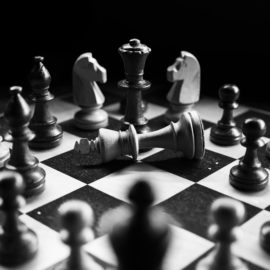

This article is an excerpt from the Shortform book guide to "Development as Freedom" by Amartya Sen. Shortform has the world's best summaries and analyses of books you should be reading.
Like this article? Sign up for a free trial here .
What is Western influence? How does Westernization affect traditional cultures in the East?
Westernization is the idea of non-Western societies adopting certain aspects of American and European cultures and values. Amartya Sen discusses the concept in Development as Freedom, where he explains that traditional cultures aren’t necessarily at risk because of Western influence.
Read below to learn more about Westernization, and determine if it’s as influential as many people say it is.
The Western Bias Critique
In Development as Freedom, Sen argues that a democracy that values freedom should be implemented in all countries to combat poor development. But it raises these questions: What is Western influence, and does his argument support Westernization?
Sen’s critics take issue with his emphasis on the importance of human rights, saying it’s biased toward Western cultures. This critique argues that the concept of human rights is a quintessentially Western idea and that it doesn’t apply to non-Western (especially Asian) cultures. Therefore, “human rights” are simply an invention of Western civilization, which has its roots in ancient Greece and Rome, and they were devised more specifically during the Enlightenment in Western Europe.
In contrast, Eastern cultures have their own ethical frameworks, which prioritize honor and obedience above liberty and individuality. These cultures are better off adhering to their own traditions, and they don’t need Western influence foisted upon them.
Examining “Asian Values”
In response to the Western influence critique, Sen contends that many “Asian values” are compatible with freedom and human rights.
First, Sen cites the tremendous diversity of Asia. Asia comprises approximately 60% of the world’s population, so claims of a monolithic set of values for the region or its people are misguided. Various religious, cultural, and literary traditions have been practiced across China, Japan, India, and many other regions.
Sen acknowledges there are aspects of Asian cultural traditions that are hostile toward freedom and individuality. He also says many Western traditions are similarly hostile. For example, Aristotle’s defense of slavery and aristocracy reveals freedom and democracy replaced aspects of the Western tradition. To Sen, the question is whether or not pro-freedom aspects are present in Asian heritage in addition to authoritarian ones.
Examples of “Western Values” in Asian Traditions
- The Priority of Truth: Confucius said the proper way to serve a prince was to be honest, even if it would offend him. He also recognized that some values, like family loyalty, could supplant the notion of total obedience to the state.
- Tolerance: The Indian Emperor Ashoka, who ruled in the 3rd century BC, wrote extensively on the importance of tolerance. According to Ashoka, all sects deserved respect and criticizing them unduly only hurt one’s own sect.
Western Influence on Traditional Cultures
Sen argues that cultural exchange has been happening for more than 2,000 years and that this kind of cross-pollination enriches, rather than harms, humanity. Many critics, however, see this as a major threat to the preservation of traditional cultures.
Sen notes that in a globalized world, Western culture dominates. For example, American fast-food chains are found on each inhabited continent, and television stations from the US are viewed in nearly every nation around the globe.
In response to the fear of culture erosion, Sen makes two points:
- Traditional cultures are valuable, and it’s up to the people in those cultures to decide for themselves how much of it warrants preserving and at what cost.
- It’s possible, and admirable, for people to appreciate the contributions of other cultures. Science, literature, art, music, and other fields have all benefited from the influence of mixing cultures.
China Cracks Down on Western Cultural Influences
In recent years, the Chinese government has been cracking down on Western-inspired cultural trends that it considers being harmful to public order. Some experts say the government has renewed the narrative of “China vs. the West,” and nationalism is on the rise. China has restricted social media, e-commerce, and private education.
China is increasingly concerned with the influence of private enterprises like Tencent, a tech company, and Alibaba, a giant in e-commerce.
The government is also cracking down on celebrity culture, which often focuses on idolizing individuals rather than on the common good. Social media accounts are closing, celebrities are being chastised for vulgarity, and video game access to minors are being restricted.

———End of Preview———
Like what you just read? Read the rest of the world's best book summary and analysis of Amartya Sen's "Development as Freedom" at Shortform .
Here's what you'll find in our full Development as Freedom summary :
- The five types of freedom that are integral to economic development
- How democracy can prevent famine
- How empowering women helps communities






